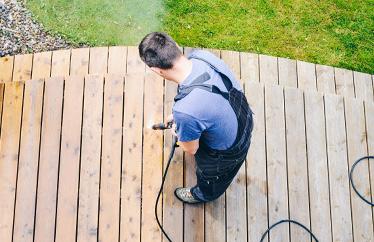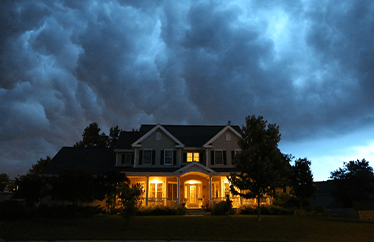Burning Issue: 41% of Homeowners Surveyed Experience Heat-related Home Damage Due to Summer Weather
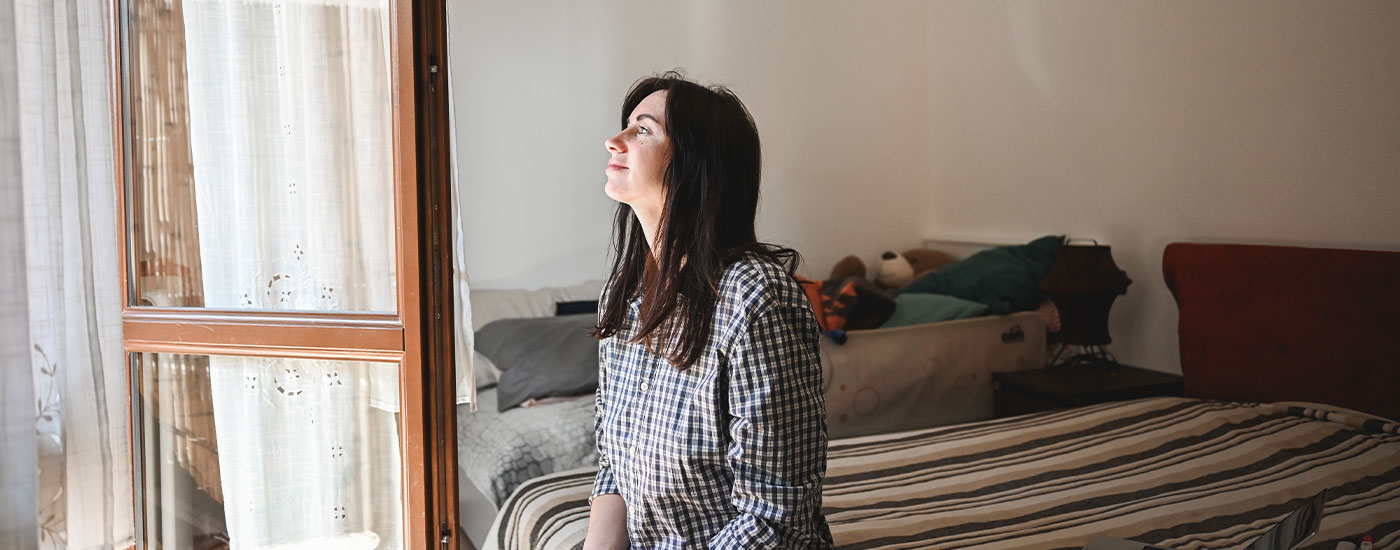
As temperatures rise, so does the concern for heat-related home damage. From increased energy costs to expensive structural damage, heat waves can wreak havoc on a home. In fact, our recent survey revealed that 41% of U.S. homeowners have experienced home damage caused by high temperatures.
Extreme heat preparedness is more important than ever since climate change is causing increasingly frequent and intense heat waves (United States Environmental Protection Agency).
We surveyed over 1,000 U.S. homeowners to find out who is at risk for heat-related home damage—and how you can be better prepared.
Key takeaways from responding homeowners
- 41% of homeowners have experienced heat-related home damage due to summer weather. Preventative summer home maintenance can help you beat the heat and protect your home.
- 42% of responding homeowners have experienced HVAC system issues during heatwaves, highlighting the increased risk of strain during peak cooling periods.
- 75% of “very knowledgeable” responding homeowners have experienced heat-related home damage, revealing a surprising gap between knowledge and preparedness.
- Nearly two-thirds (65%) of U.S. homeowners are interested in learning more about home protection measures against heat-related home damage. This high level of interest highlights a growing desire for comfort and potentially lower energy bills in the face of rising temperatures.
- Homeowners prioritizing heat-related home maintenance are more likely to worry about rising energy costs. By addressing potential problems early on, homeowners can help avoid expenses down the line.
- 85% of responding homeowners completed at least one action to protect their home from heat-related damage. This finding suggests a widespread concern regarding heat-related issues in homes and a willingness to take action.
42% of homeowners experienced HVAC issues in past heat waves
A failing HVAC system during a scorching summer can lead to discomfort, costly utility repairs, and even health risks for more vulnerable populations.
Unfortunately, HVAC issues are a reality for 42% of U.S. homeowners who responded to our survey. Yet, fewer than half (47%) of these homeowners had their system professionally serviced within the last year, and even fewer (32%) said they’d done basic cleaning and maintenance for home appliances to help prevent heat-related home damage.
This gap highlights the importance of regular professional HVAC maintenance to help prevent unexpected issues during periods of extreme heat.
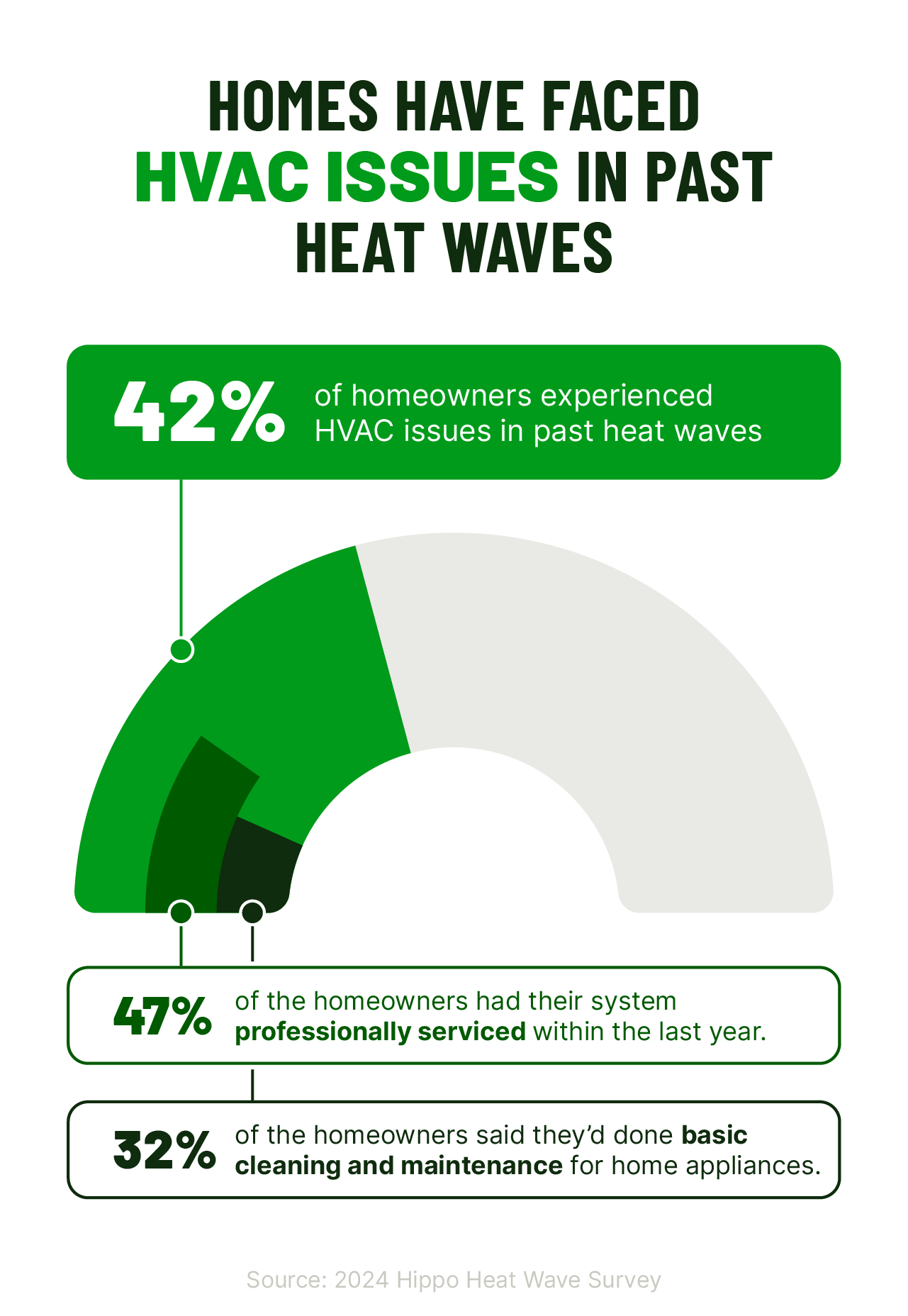
In addition to neglected HVAC maintenance, here’s how seemingly separate home maintenance issues can cause a chain reaction that harms your HVAC system:
- Clogged ducts or failing ventilation systems can restrict airflow, making it harder for HVAC systems to distribute air efficiently. This can force your HVAC to work harder, reducing efficiency and increasing energy bills.
- A failing water heater or poorly insulated areas can add extra heat to your home. The HVAC system then has to work harder to maintain the desired cool temperature, leading to strain and potential breakdowns.
- Faulty wiring or overloaded circuits can affect the power supply to your HVAC system. This can cause malfunctions, shut downs, or reduced operating capacity.
If you live in an area susceptible to heat waves, comprehensive inspections and cleanings could potentially help you save on your electric bill and reduce the strain on your cooling systems.
If you’ve done everything you can to maintain your machine, an HVAC system’s age could also be a culprit. According to the U.S. Energy and Information Administration, a significant portion of air conditioning equipment in the U.S. is either nearing or past its prime.
Twenty million units are 10-14 years old, and 11 million units are 15-19 years old. During your next round of routine maintenance, consider the age of your machine. If it’s past the 10-15-year mark, it may be time for a replacement—especially if you live in a traditionally hot climate.
56% of respondents in lower-income households experience heat-related home damage
Our new data reveals a troubling trend: A substantial number of U.S. homeowners (41%) who responded to our survey have experienced heat-related home damage in the past. And as household income goes down, incidents of heat-related home damage soar higher.
According to the U.S. Census Bureau’s 2022 Income in the United States report, $74,580 is the median household income in the U.S. With this information in mind, we categorized “low-income” survey respondents based on if they fell within or below the 20th percentile, which equates to $30,000 or less in annual household income.
The majority (85%) of responding homeowners within this income categorization report feeling concerned over heat-related energy costs. That includes respondents who claim they are either “somewhat knowledgeable” (30%) or “very knowledgeable” (44%) about the home and utility risks associated with prolonged heat exposure.
Despite this knowledge and concern for their homes, 56% of responding homeowners in this income category have suffered home damage from hot summers.
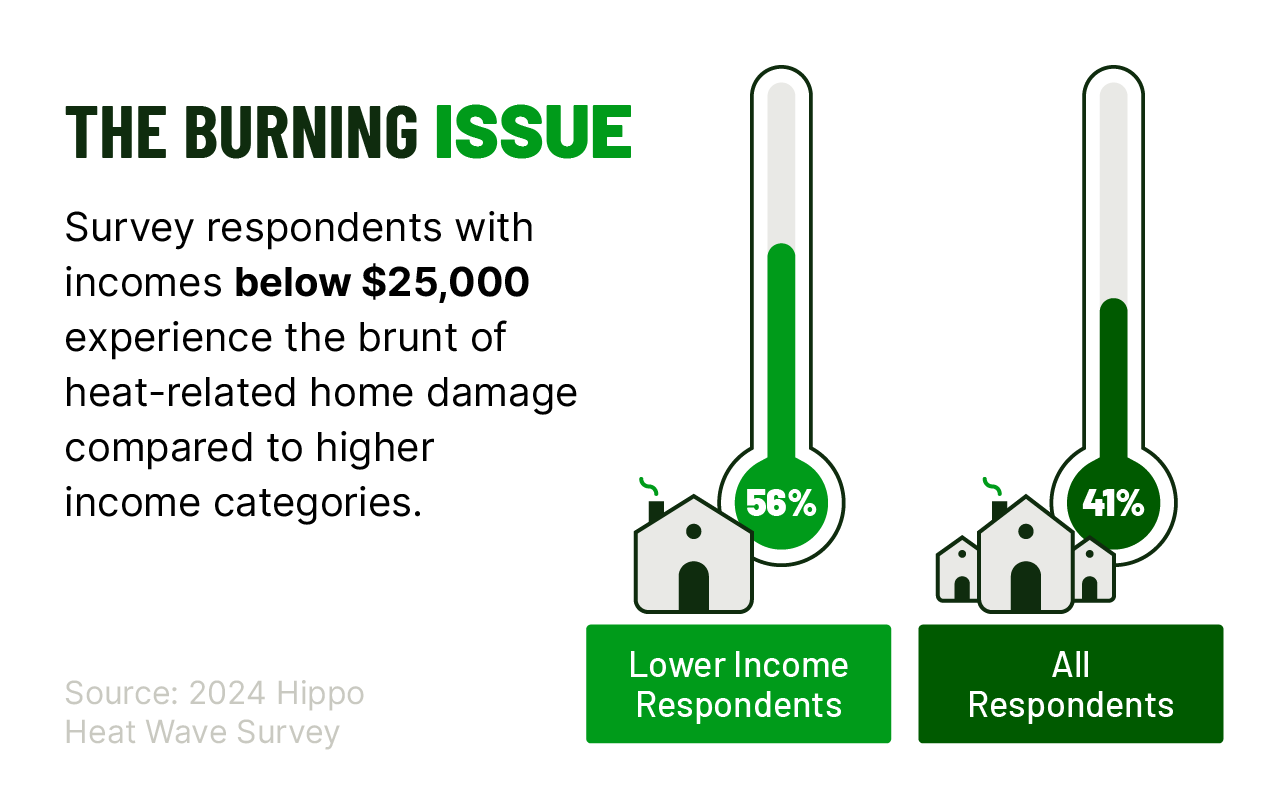
These findings suggest a financial barrier for many homeowners. This could be due to a myriad of conditions, including the expenses of living in an older home that is less expensive but also less energy-efficient. Older homes could have poor insulation or lack the materials or design features needed to withstand high temperatures.
However, even newer homes can suffer if homeowners neglect preventive summer maintenance. Existing home damage or the cost of home improvements, like upgrading insulation, can cause a financial strain.
Prioritizing summer home maintenance is an affordable solution that can help lower-income homeowners avoid costly repairs in the future.
Additionally, initiatives like Habitat for Humanity’s Home Preservation Program offer repair and maintenance services to low-income homeowners. And depending on your location and income level, there may also be government weatherization assistance or emergency home repair programs offered by your city or county.
By exploring these resources, homeowners can take essential preventative measures to help limit heat damage to their homes, potentially avoid costly repairs, and move closer to their financial goals.
65% of U.S homeowners are interested in learning about heat protection measures
An encouraging trend is emerging in the U.S. housing market. According to our survey, nearly two-thirds (65%) of U.S. homeowners want to learn more about heat protection measures for their homes.
This surge in interest points toward a growing desire for comfort and cost savings on energy bills. Our data further supports this theory, revealing a potential correlation between those concerned about high utility bills and those who have completed actions to reduce energy use in their home.
For instance, of the homeowners who installed or upgraded their insulation to combat heat-related home damage, 80% said “yes” when asked if they were concerned about increased utility costs associated with a hotter-than-usual summer. By comparison, 49% of those who did not complete any home maintenance tasks said “yes” to the same question.
In addition to these insights, our survey also identified a potential gap between theoretical knowledge and practical application. Twenty-seven percent of survey respondents consider themselves “very knowledgeable” about heat-related home threats, and 42% consider themselves “somewhat knowledgeable.”
Despite this self-proclaimed proficiency, 75% of “very knowledgeable” and 42% of “somewhat knowledgeable” homeowners have experienced heat-related home damage.
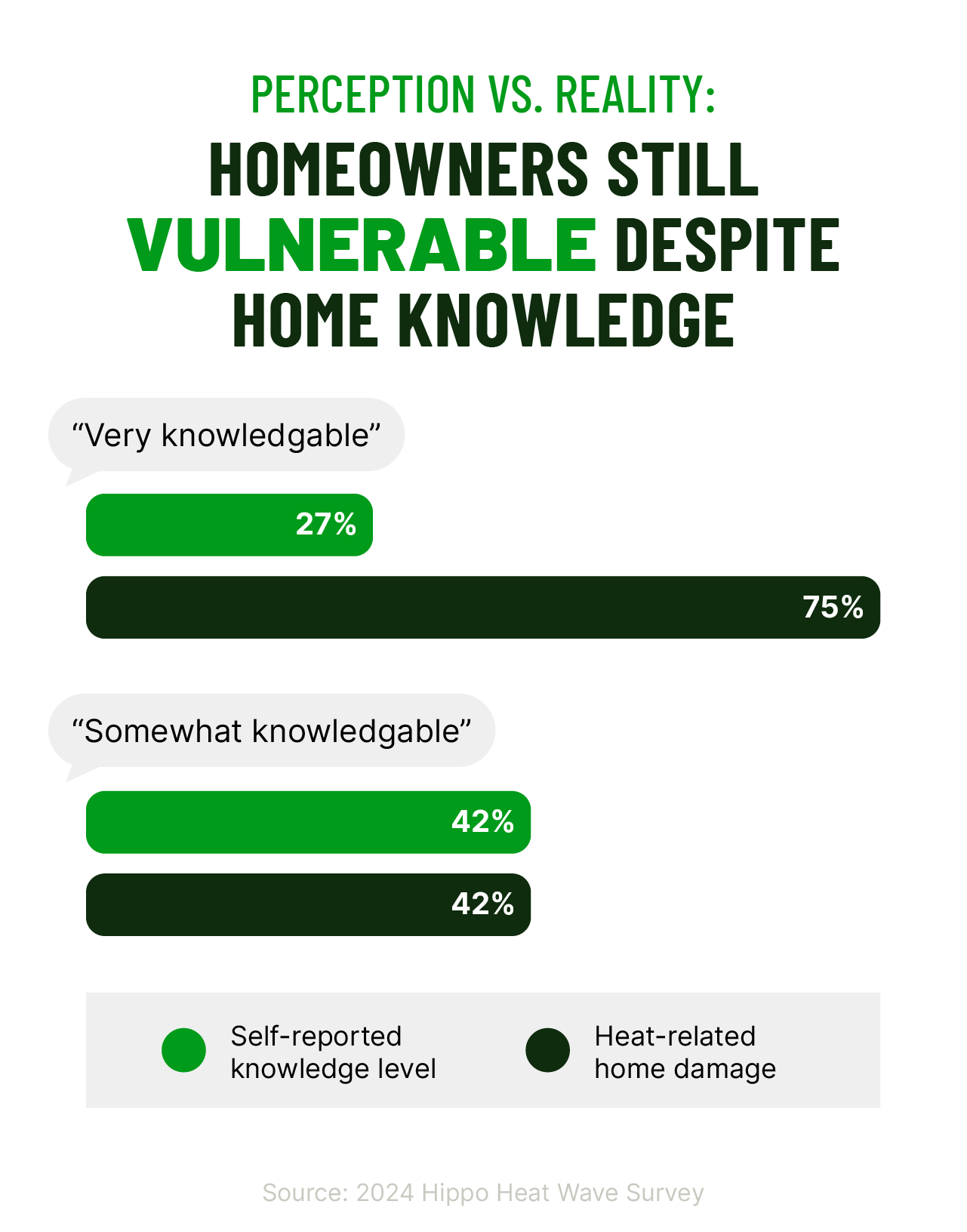
This high percentage of homeowners experiencing heat-related home damage (despite perceived knowledge) suggests the need for more education and action around preventative maintenance measures.
And while all this is true, our data also reveals an encouraging trend: 85% of surveyed homeowners completed at least one action to protect their home from heat-related damage. This indicates a strong willingness to help safeguard their homes from heat-related damage.
Actions homeowners can take to protect their homes from high temperatures:
- Seal leaks, cracks, or gaps in windows, doors, attics, and foundations. Caulk, weather stripping, or foam insulation can plug these leaks and help prevent hot air from entering the home.
- Add proper insulation in attics, walls, and floors to help create a barrier against heat transfer and keep your home cooler.
- Install window treatments that block sunlight using curtains, blinds, or even blackout shades. You can also use reflective window film to help further deflect heat rays.
- Explore options for reflective roof coatings or materials that deflect sunlight and heat to help keep your home cool.
Tools like the Hippo Home app can help make routine maintenance easier. With the app’s personalized maintenance checklists and 24/7 expert advice, you can help prevent home damage from unexpected events—before they become big problems.
Methodology
The survey was conducted by SurveyMonkey Audience for Hippo Insurance Services. The survey was fielded on May 10, 2024. The results are based on 1,207 completed surveys. In order to qualify, respondents were screened to be residents of the United States, over 18 years of age, and own a home. Data is unweighted, and the margin of error is approximately +/-3% for the overall sample with a 95% confidence level.
Disclaimers
YourHaus, Inc. ("Hippo Home") is an affiliate of Hippo Insurance Services. Services (including all repair or maintenance services) provided to customers through affiliated and unaffiliated third-party contractors. Your use of Hippo Home is subject to Hippo Home's terms and conditions and privacy policies. Use of unaffiliated third-party vendors is subject to the terms of service provided by such third party. Hippo Insurance Services is not responsible for your use/non-use of Hippo Home or any service vendor. @ YourHaus, Inc. 2023
Hippo Insurance Services ("Hippo") is a general agent for affiliated and non-affiliated insurance companies. Hippo is licensed as a property casualty insurance agency in all states in which products are offered. Availability and qualification for coverage, terms, rates, and discounts may vary by jurisdiction. We do not in any way imply that the materials on the site or products are available in jurisdictions in which we are not licensed to do business or that we are soliciting business in any such jurisdiction. Coverage under your insurance policy is subject to the terms and conditions of that policy. Coverage and coverage amounts selected are the decision of the buyer.
This guidance and advice is not error-proof and not applicable to every home. You are responsible for determining the proper course of action for your property and neither Hippo nor Hippo Home is responsible for any damages that occur as a result of any advice or guidance.

